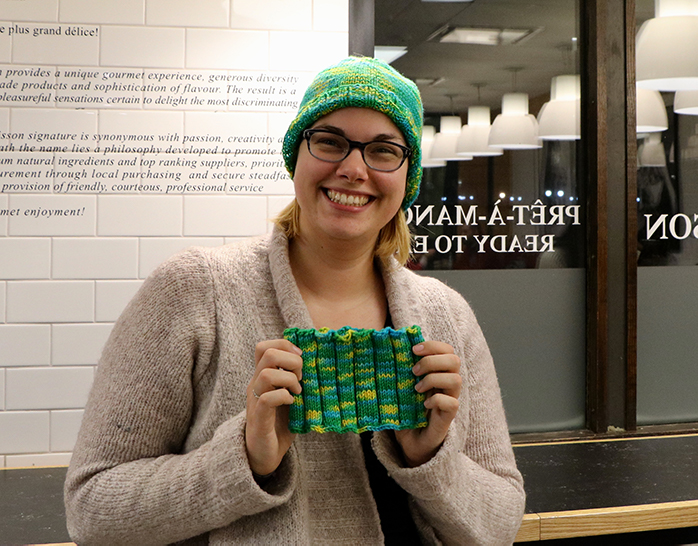Although perhaps an old-fashioned method of stocking your winter wardrobe, knitting has benefits beyond the sense of accomplishment of making your own scarf. The McGill Students Knitting Club aims to promote appreciation for the craft among students, gathering anyone interested in learning and all things yarn-related.
The McGill Students Knitting Club gained official SSMU club status last year. Nonetheless, it has since grown to become the place to go on campus for all things yarn-related since it was initiated in 2013 by Alejandro Carboni, a McGill graduate. It aims to be an inclusive club which welcomes all those interested in knitting, crocheting, discussing fibre arts, or simply experimenting with a new hobby. By offering beginner materials and teaching technique during weekly meetings, the knitting club welcomes first-time knitters with open arms.
“Our main event is our weekly meeting where we sit around and knit,” Noemie Tremblay-Lamontagne, U3 Arts student and Vice-President Resources of the club, said. “We talk about classes, and professors, things we like and things we dislike. Knitting is stress-relief and it helps to be able to [knit] around other people.”
The sense of calm that Tremblay-Lamontagne experiences while knitting is scientifically backed. According to a 2013 study in the British Journal of Occupational Therapy, there is a significant correlation between knitting and feeling calm. The study showed that knitting also has the potential to increase brain function.
The hobby has proven social benefits too. The same study found that knitting in a group can increase happiness and improve social skills by providing a commonality between members, giving them both a sense of belonging and confidence.
Yet, for those who are taking up knitting for the first time, the thought of practicing their skills in front of others can sound intimidating. In order to accomodate first-timers who may feel nervous about their ability, the knitting club hosts beginner workshops at the start of every semester, taught by seasoned members.
“Usually, the very first thing that beginners do is grab a piece of yarn and needles and [just] try to knit,” Tremblay-Lamontagne said. “At the very beginning, [one’s knitting] is really uneven and [they] don’t know how to do different motifs. Once you know how to knit, you can do really pretty things. For [starters], a scarf is easy cause you only need to go back and forth, unlike a hat, in which you have to go around, and socks, which are extremely difficult.”
Another common barrier to access is the gendered association knitting holds. Knitting is stereotypically thought to be performed by women because of the historical link between femininity and domestic craft. It is also seen as old-fashioned due to its impracticality and inefficiency in the modern world, so it’s not something many McGill students would think to do in their limited spare time.
According to Tremblay-Lamontagne, members of the knitting club have felt the impact of this stereotype firsthand. At one point, a prospective member asked them whether their club was for women only, simply because of this implication. The McGill Student Knitting Club works hard to challenging stereotypes about the craft by emphasizing its relevance in the lives of busy students and creating a space for anyone interested in this hobby to do so.
“[Knitting Club] is really diverse,” Tremblay-Lamontagne said. “We have a surprising amount of guys […] which is a good thing. We have grad students, we have undergraduate students. There are people in Arts, Engineering, Science, and Agriculture. […] It’s a very welcoming and low pressure environment.”









